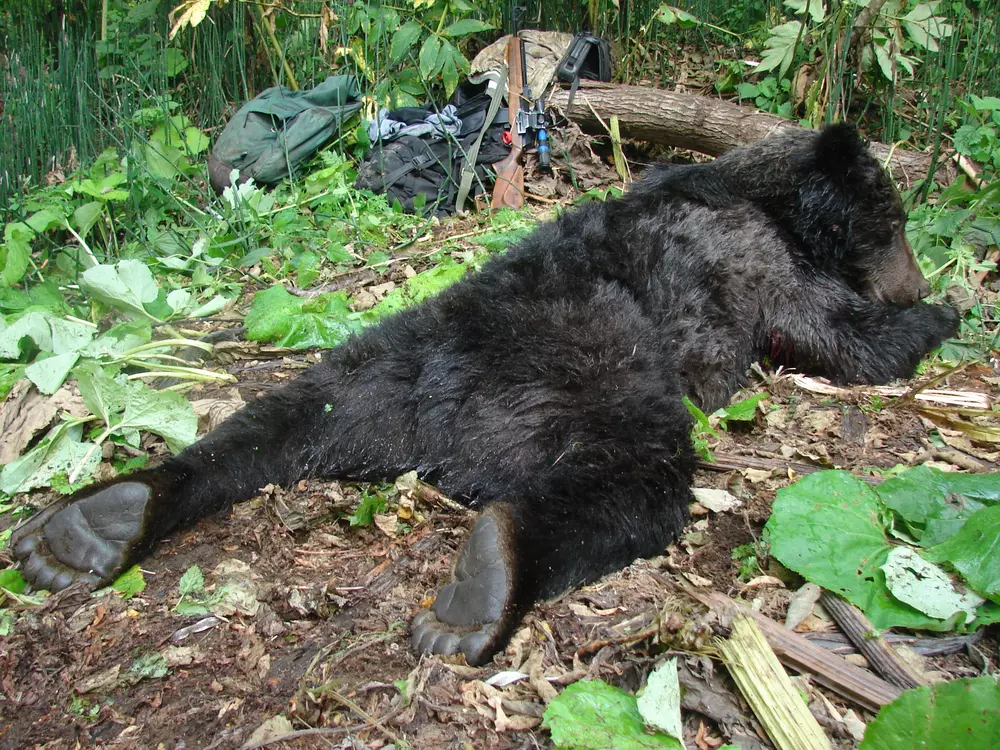Bill Would Halt the Trade in Bear Gallbladders, Paws and Bile, Align Vermont’s Wildlife Trafficking Policies with More than 40 Other States
Montpelier, VT — Animal Wellness Action celebrated the successful passage of a provision in State Bill S.301 to prohibit the sale of bear bile and other internal organs used in Traditional Chinese Medicine (TCM). The larger bill, now heading to Gov. Phil Scott’s desk for signature, aligns Vermont with more than 40 other states that restrict the trade in bear gallbladders and bile, as a way to halt poaching of bears for use in Traditional Chinese Medicine (TCM).

The bear hunting season in Vermont is one of the longest in the country, starting on Sept. 1 each year and running through Nov. 24 this year. Protect Our Wildlife Vermont documented that there is trafficking of bear gallbladders and bile within the borders of the Green Mountain state, and that revelation provided impetus to Animal Wellness Action and POW Vermont to work to urge state lawmakers to address the issue. During testimony to the Senate Agriculture Committee, a lieutenant from the warden service confirmed that wardens from the Vermont Fish and Wildlife Department are actively investigating cases involving trafficking of bear gallbladders and bile.
Bear gallbladders and bile have long been sought after for their perceived medicinal properties in TCM. However, the extraction of these bodily fluids involves killing wild bears or “farming” bears and keeping them in extreme confinement, driving poaching in the wild and cruelty in captivity.
“We shouldn’t kill rhinos for their horns or bears for their gallbladders, and we’ve got to stop thinking of rare megafauna as repositories for potions and treatments,” said Bob Galvin, Vermont State Director for Animal Wellness Action and the Center for a Humane Economy. “Commercial killing of wildlife for trade in their body parts causes pain and suffering for the animals and it puts these animals at risk even though alternatives exist when it comes to treating human illness.”
“By banning the sale of bear parts, we are taking a stand against the exploitation of these magnificent creatures who are vital contributors to healthy ecosystems, ”added Brenna Galdenzi, president and co-founder of Protect Our Wildlife Vermont. “Because allowing the legal sale of bear body parts incentivizes poachers, this new bill will decrease demand and help protect bears from poaching activity.”
The significance of this legislation extends beyond Vermont’s borders. In 2022, the Chinese Ministry of Health controversially endorsed bear bile as a palliative treatment for COVID-19, potentially exacerbating the exploitation of bears worldwide. Bear farms, notorious for their inhumane practices, continue to operate in China and other countries and pose a threat to both captive and wild bear populations.
Furthermore, China’s absence of wildlife trade policies poses a risk to global conservation efforts. Poaching rings targeting the extraction of bear gallbladders have been uncovered in U.S. national parks, underscoring the urgency of addressing this issue internationally.
“Evidence reveals that wildlife traffickers are soliciting Vermont hunters and poachers for gallbladders, which are then sold into Traditional Chinese Medicine (TCM). The traffickers may pay only $50 or $100 for a bladder, but then can sell it on the international market for 10-to-20 times as much,”Galdenzi disclosed.
“The United States has an opportunity to lead by example in banning the trade of wildlife parts, which could positively influence China’s internal policies,” added Galvin. “Just as our bans on the sale of dogs for meat and elephant ivory have had ripple effects, we hope this legislation will help advance a commitment to wildlife conservation.”
Animal Wellness Action commends Vermont lawmakers for their proactive stance in protecting bears and calls on other states to enact similar legislation to safeguard wildlife for future generations.

